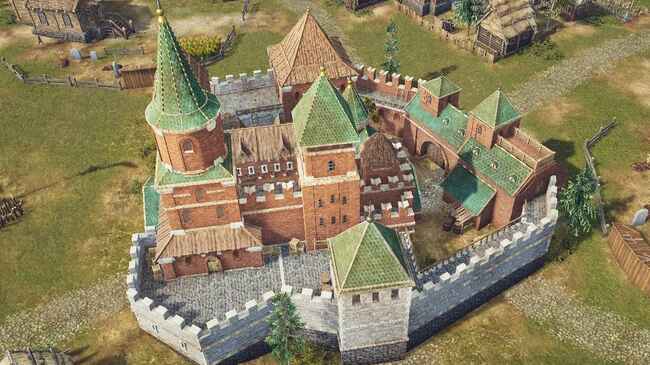Table of Contents Show
A New Sovereing! To-do-list – Beginner Tips – Basics Guide For Early Game.
Basics Guide & Beginner Tips
In this guide I want to make a to-do-list for everyone who starts a new map. This will include the basics of the game, how to optimize ressources, create a strategy and how to handle your economy.
Contents
0. Everything in a Nutshell
1. Manage your Economy!
1.1 Get a merchant!
1.2 Check your provinces and assign governors wisley!
1.3 Which constructions should you build first?
2. Make plans with friends and foes!
2.1 Plan war
2.2 Care for relations
2.3 Do you need a diplomat?
3. Think ahead!
3.1 Look for marriage-partners
3.2 Clerics and Spies
3.3 Rise a Trade-Empire
3.4 Kingdom Traditions and Kingdom Adventages
All steps in a Nutshell – 15 Checkpoints to become the Sovereign!
To-Do-List for game start.
- Hire 1 merchant and get him to trade
- Assign Governors wisely. Check if your royal family provides any knights or recruit some.
- Search for the province with the most villages and construct the buildings “Village Militia” and “Housings”.
- Recruit troops asap, since your population needs some time to regenerate.
- 5.Secure that your Food Income is sufficient and matches your troop numbers. Have at least 20 (or even 30) Commerce Points aviable.
- Check your Stances and Relations and choose an easy first target to attack. Make some trade- and non-aggression-pacts while you’re at it. Try tp allign marriages!
- Have 2 Marshalls avaible and recruit as many Village Militia and Peasants as possible. (Remember, if a non-marshall-knight is though a marshall skill, you can call him to function as an army leader)
- Attack a weak Kingdom next to yours.
- Build Barracks (Upgrade Fletchers and Spearman) to deal with other Kingdoms and Rebels.
- Hire 1 diplomat (send him to improve relations) and 1 cleric (adopt population and book-generation are very useful). You should also have at least 2 merchants at this point. A spy can be useful, if you are plan war against a formidable foe.
- Skill your Knights and look for benefial governing-bonuses.
- Plan on what Goods to produce first. They all provide different bonuses.
- Make long-term-plans: Choose your future foes and allies -> Consider what Goods and benefits each Province provides!
- Look for ways to increase your economical Income = Commerce Points, Books, Levies! + Look for ways to increase kingdom stability!
- Rise an Empire!
1. Manage your Economy!
Get a merchant!
The most important ressource will be gold. That’s why the very first thing to do is to hire merchants. First of all, check your royal family and call them into your Court – there might be a merchant already!
Each merchant needs the following to get started (Check if you have that):
1 Kingdom with which you have a trading agreement
10 Commerce Points (Sack Symbol left to your food income)

Commerce Points can be increased by constructing certain buildings (for example market squares, harbors etc.) and clever governing of towns (see next section). Depending on how many Commerce Points you have (10 or 20) you should hire at least 1, or even better, 2 merchants and get them to trade with a kingdom. This will rise your permanent income and will quickly outmatch the costs you spend to hire the merchants.
Check your provinces and assign governors wisley!
Next you should check your provinces in the Province Overview (Press: LeftShift Q).
This gives you very important information, since it shows you which and how many of the 7 ressources are produced.
Ressources
Gold
Books
Religious Power
Commerce Points
Food Income
Levies (= Trained Soldiers)
Settlement Population
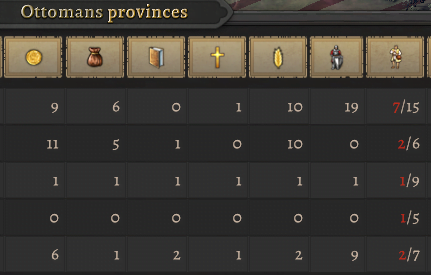
Check how many and which kind of settlements each province has:
Villages -> Generates Population and Gold
Castles -> Generates Levies
Religious Settlements -> Generates Books and Religious Power
Crop Farms -> Generates Food
Others (Logging Camps, Herb Gardens, Cattle Farms etc.) -> Generate Gold (+ Bonuses related to Upgrades)
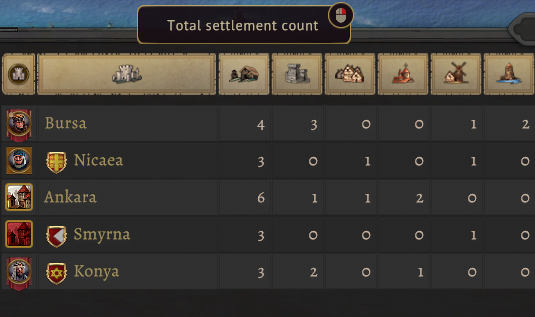
(Hints:
Costal settlements are those settlements, which are near to seas and oaceans and are not counted on top of your existing settlements;
Do not confuse “Settlement” and “Village” -> Every Village is a Settlement but not every Settlement is a Village!)
Why is this information important? Well, it is important to note, that each town only produces a small amount of ressources when ungoverned (~10% of the total potential). The 100% can only be provided, if they are governed by a knight! On top of that, each knight-class gives Ressource Bonuses when they govern towns. They give basic bonuses on default, but other bonuses can be added if you teach them specific skills!
(Hint: Skills increase their potential, when they are leveled up to Level 3, are possesed by a king or are a Kingdom Tradition.)
Default Bonuses
Marshalls: +1 Levies per Settlement; +1 Levies per Castle
Merchants: +1 Gold per Settlement
Clerics: +1 Book
Diplomat: +1 Food Income per Settlement; +1 Commerce Point per Settlement
Spies: +1 Gold in Villiges; +1 Levies in Castles; + Kingdom and Province Stability
King: Independently of the Class the King gives an Omni-Boost which scales with the
number of settlements.
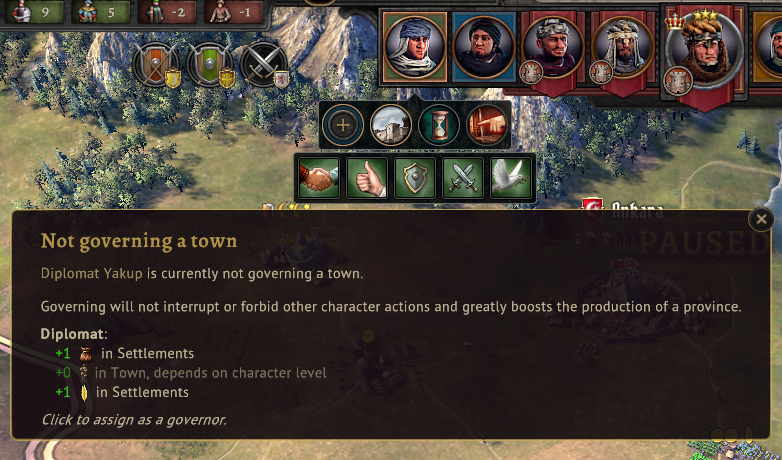
Government should be distributed like this:
Marshalls -> Province with most Castles
Merchants -> Province with high amount of total Settlements
Clerics -> Province with religious settlements
Diplomats -> Province with high amount of total Settlements
Spies -> Province with Villages and Castles
King -> Province with high amount of total Settlements + Depending on Class
Your job is to consider which ressources you need and you should choose your assignments wisley. After assigning a governer, you can teach him skills to get even better bonuses. For example, some secondary merchant skills increase gold income; secondary clecric skills often boost your Book and Religious Power Income.
Which constructions should you build first?
After getting your economy organized, you should start constructing buildings.
Here you have 2 main goals:
- Since your first primary goal is to take over a province of a weak nearby kingdom (or to defend yourself), you need an army fast before the foe grows to strong to handle.
- You want to build up your Gold-Generation even further.
For the first goal there could be certain problems, if you started the game with “normal” starting Gold (sometimes even a “high” amount of starting Gold isn’t enough):
- The construction of ‘Barracks’ (including the Upgrades Fletchers and Spearmakers) costs 2.000.
- Recruting military units costs 150-200 Gold, some Food and Levies. Ressources you might not have right now.
- Since Peasants are very weak, you want Village Militia. They don’t cost any Levies and are more affordable in general, but require 3x more Population (= the little guy-icons above your towns) and some food.
Now your job is to achieve your goals and adress those problems. You need to secure that you have an army with some Villiage Militia to have an adventage over your foe. At the same time you want to extend your economy. The best way to achieve all of this is by doing the following!
First, check your provinces again:
Since Village Militia needs a lot of Population, and as we learned Villages produce Population, you need to construct the building “Village Militia” in the town with the most amount of Villages. On top of that, you want to build “Housings” in the very same town, so that you can generate more Population!
Hint: ‘Herb Gardens’ and the Upgrade ‘Herbalist Shacks’ increase your Population Growth aswell.
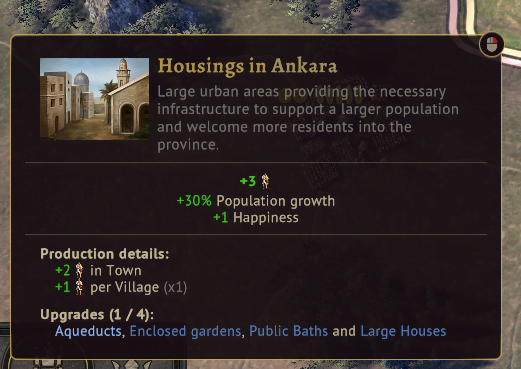
After that, check your Food supplies! It should be around 10. If you do not have 10 Food aviable, you should build one of the following buildings: Crop Farming OR (only if you have the nessecary Province Features) Cattle Farming; Sheep Farming; Horse Breeding.
Provinces which do neither have a lot of villages nor castles, but farms can now be used to generate some food (ofc any town can produce food, but these are better in long terms). Since you need food to maintain a happy army, your Food Supply needs to match the number of Troops you have.
To generate some direct gold income and commerce, establish trade agreements with other Kingdoms. To increase your commerce, assign governers, teach skills and look out for buildings, which increase your Commerce Points for little money. With 20 Commerce Points you will be able to make profit out of 2 Trade Agreements at once. With 30 Commerce Points you might be able to increase your profit.
After that you can finally save some money to build the Barracks in the town with the most castles. Building military buildings (excluding village militia!) in such towns will provide more levies, espacially if you want to build ‘Lord Castels’ in the very same town! For Upgrades I advice to go Fletchers and Spearmakers first, and Stables second, but be aware that Cavalry Units, while efficient, need almost twice as many ressources to recruit (Gold, Population, Levies and Food Income). Swordsmith can’t really tank a lot and are harder to keep healthy at the start of the game.
In a nutshell this is your Build-Order
1. Village Militia and Housings in a province with villages (the more the better)
2. Crop Farm OR Animal Farm, so that your Food Income matches your army strengh
3. 20 (or even 30) Commerce Points and 2 Merchants
4. Barracks in a province with castles (the more the better)
After that build whatever you see fit!
2. Make plans with friends and foes!
How to plan war!
After managing your economy and getting ready for war, you should have recruited some Village Militia and probably some Peasants aswell. To stand a better chance in battle, it is very wise to have at least 2 marshalls! Even a marshall without any troops is a very cost-efficient way to generate some well needed manpower, since every marshall provides his own cavalry squad.
All that’s left, is to decide who to pick as a target! Take a look in the world map!
In the beginning of a game the 2 most important view-options are “Stances” and “Relations”.
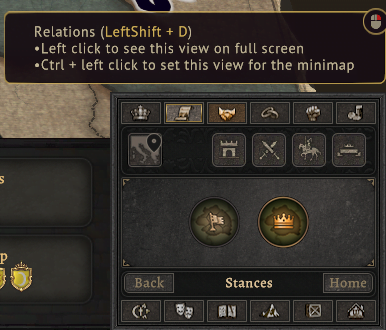
Let us look at this situation (it is not a starting position; but let’s just imagine it would be one):
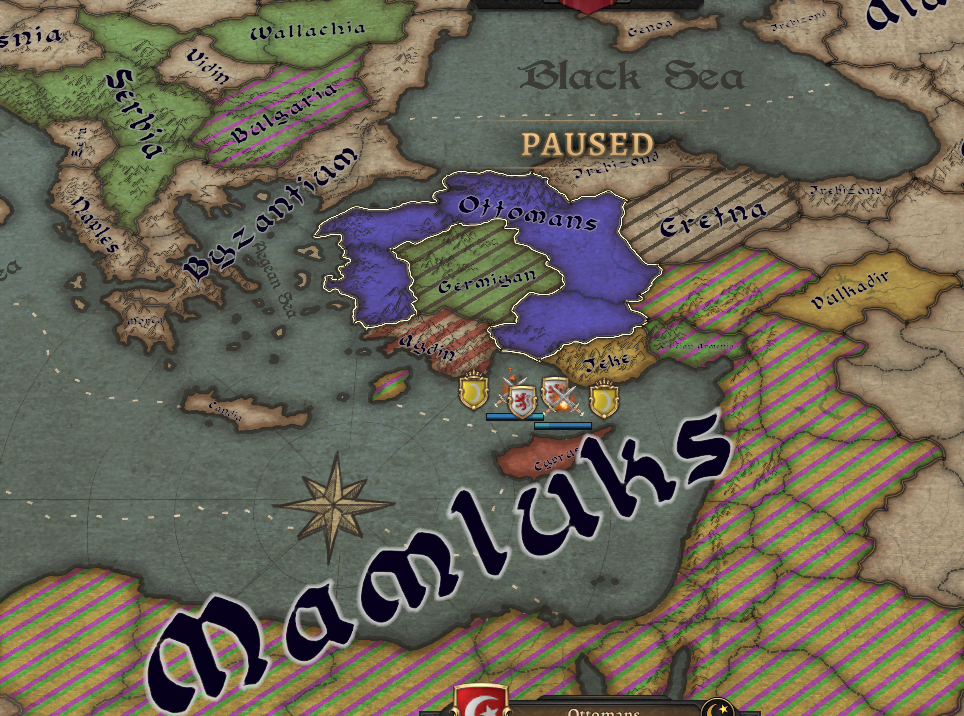
This is the “Stances” – View. Here you can see with which kingdoms you are in war against and with which you have trading agreements or pacts.
We, the Ottoman Empire, are currently in war against Aydin and Cyprus. While we have 5 Provinces, Aydin only has one, which makes them an easy target. The same goes for Cyprus, which are currently being attacked by the mighty Mamluks and are probably weaked.
If this would be a starting scenario, the Aydins would probably only have peasants, maybe some archers or one stack of spearman. It all depends on how much time has passed since you started the map! That’s why it is important to strike as soon as possible!
This means:
1. Get 2 Marshalls (Remember that every class of knight can function as a marshall, if they have at least 1 Marshall-Skill)
2. Equip as many Village Militia as your ressources allow (You will not need 9 stacks of units).
(You should aim for 3-4 stacks)
3. Gather Peasants from all Provinces
(Maybe 2-5 stacks)
4. Attack!
In this specific scenario I actually started with 3 provinces and attacked the province above Aydin, which once was a humble kingdom I had a bad relation with. This worked even on hard difficulty. But be careful! Some neighbors might look week, but have very good relations with a powerful kingdom, which could join them in war against you. It is wise to choose target, which doesn’t have any powerful supporters.
(Hint: Later in the game, you will be able to send a Diplomat to the friends of your targets and try to agree on non-aggression-pacts, so that they don’t interfere. Large Kingdoms can be assaulted if you manage to create Invasion-Plans.)
A bit later in the game, there is even more to consider. For example, you could observe the enemy Provinces and Marshalls.
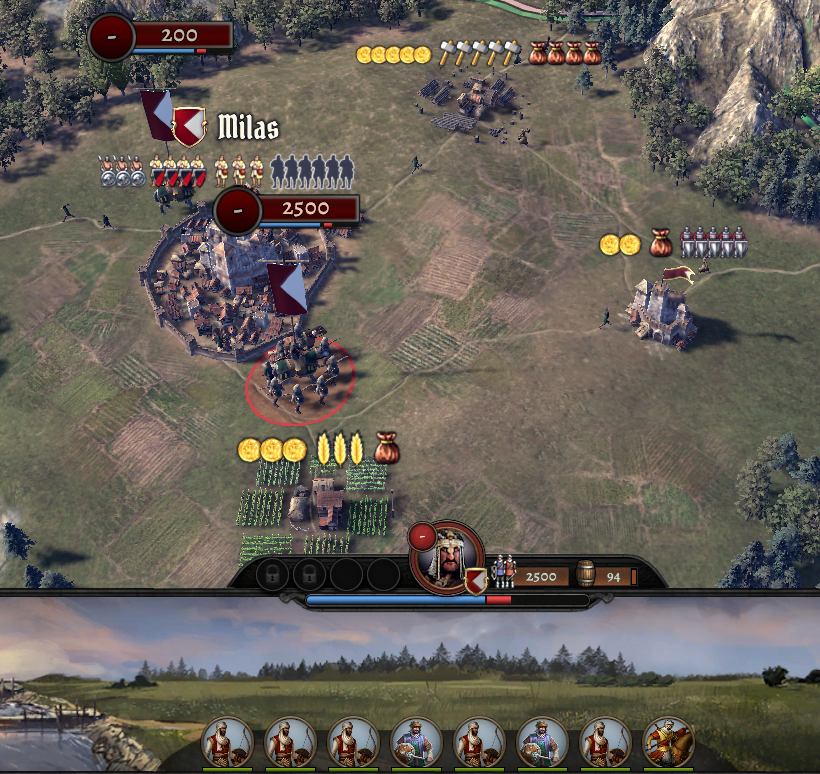
In this screenshot you can see that the Aydins don’t only have peasant, but a pretty decent force with 5 stacks of Archers and even Cavalry. Since their king is a Marshall aswell, probably even more units await me in Milas. A glance on the province shows, that they have 4 stacks of Garrison troops and 3 Population, which meens that they can produce at least 3 more units, if needed.
All this information can help you to decide, if victory is possible. And if it is possible, what would it cost and at what state would your Kingdom be afterwards?
By the way, Spies can be used to infiltrate enemy kingdoms and reveal all these informations to you. This also includes what Buildings are already constructed in their towns, also which units are stationed there and which units are lead by enemy marshalls.
Caring for Relations
Let’s change the view – from “Stances” to “Relations”
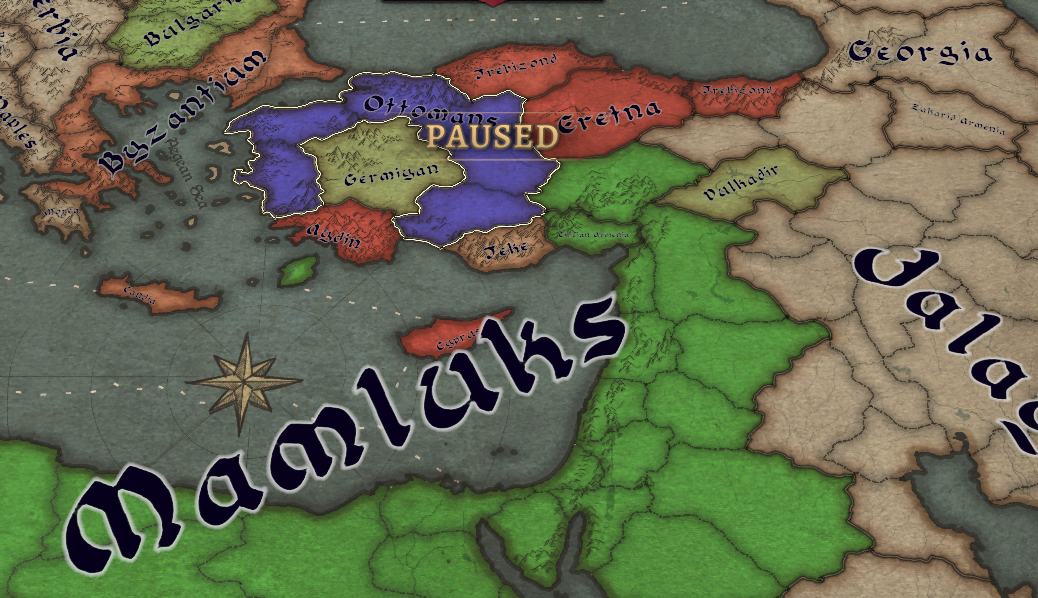
From this view we can see that the relations to Eretna, Jrebizond and Byzantium are pretty bad. They could declare war against us any time. This can be good, bc we get a chance to attack their kingdoms and potentially siege some provinces or vassals. But it would be bad, if we don’t have the necessary manpower. That’s why we should think twice about where to send our troops. An all-in against Aydin and Zyprus could cost us many troops, leaving our kingdom weak against these Kingdoms and potential Rebels.
That’s why it could be benefitial to get a diplomat and let him enable a pact against those kingdoms. For example, I managed to create a good relationsship with Bulgaria and they invited me to a Defensive Pact against the Byzantium Empire. This means, if Byzantium declares war against me, Bulgaria, Serbia and Wallachia would fight them aswell, which would make it way easier to defend my kingdom. My next step could be to form a defensive pact against Eretna. Alternativly I could form an offensiv pact against Eretna and convince the Mamluks to fight on my side.
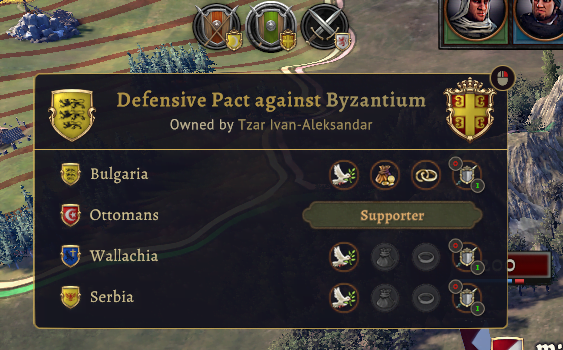
Do you need a diplomat? How important are relations?
Short answer:
Yes, you should have at exactly 1 Diplomat, but he doesn’t have to be active all the time. If you start the game with very good relations and stances, you don’t have to get one right away.
Explaination
Pros:
1. You can form more trade-agreements (Later in the game you will need trade-agreements with specific and probably far-away kingdoms to get that one ressource which is not acessable to you for a kingdom adventage)
2. Non-Aggression Pacts and Alliences are way easier to get into
3. Good Relations let you easily search for marriage-partners (without a rightful heir, you kingdom will have problems – Also having a lot of bois gives you free knights for your royal court)
4. You get a lot of controll on making plans and won’t get surprise-attacked that often
5. Good Relations to powerful Kingdoms will make it very unlikly that they start a war in which you stand little chance against them.
6. By “Negotiating Piece” they make it more likely that other Kingdoms agree to your Piece Proposals.
7. Diplomats give Bonus Commerce Points and Food Income when they govern a province.
Cons:
1. It takes 1 space in your Court, ergo one less Marshal or Merchant
2. It costs some gold
3. Think ahead
Lasty there are some general Tips
Look for marriage-partners
-> Secruring that you always have a rightful heir is important for the stability of your kingdom after your king dies.
-> Having a lot of children is good. You will get free knights and a merriage can help you to maintain good relations.
-> Sometimes you will be able to claim territory because of your royal bonds (but the opposite can happen aswell…)
Clerics and Spies
Do not underestimate the power of clerics!
Books are a very important ressource in this game. A high-level Cleric can provide a lot of them, espacially when you choose “Writing” or “Learning” as a Kingdom Tradition. They can also increase Kingdom stability with their “Welfare action”, adopt populations, negotiate piece with rebels and convert the religion of your provinces (which also increases stability and boosts clerigy opinion).
While spies require a lot of skillpoints to be useful reliably, they can give you a lot of information about enemy armies, their position, which buildings a town has, what units are stationed there etc. Sometimes this can decide if I start a war or not. For a mere cost of 5 Income this might be worth it, even if you don’t use his actions. I often try to find out, in which towns the enemy constructed Barracks and try to directly strike their ‘Military HQ’.
Rise a Trade-Empire
Certain Buildings can generate a high amount of Commerce Points! If you have multiple provinces with the same bonuses (for example 3 provinces with cattle farms), a single upgrade will effect all provinces. That’s why it is better to upgrade those buildings, which are aviable in multiple regions. Espacially the Harbor has the potential to increase Commerce Points, if you have a lot of coastal settlements.
But why should you have high Commerce? High leveled merchants will expand their trading, if they have at least 20/30/40 Commerce aviable and it also becomes possible to export food for 10 Commerce. All this will boost your Gold-Income. With proper skilling, a single merchant can get you ~300 income.
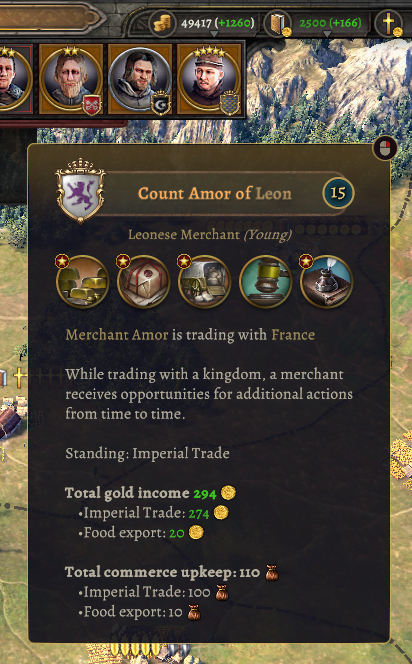
It is also noteable, that every knight (regardless of class) has the potential to lern merchant-skills. Espacially the “Trading”, “Logistics” and “Stewardship” are helpful, if you want to boost your Gold Income or Commerce! Making any of those your Kingdom Tradition will not only benefit your treasure chamber immensly, but it will allow you to teach these skills to every single one of your knights!
Kingdom Adventages and long-term invasion plans
Lastly, for long term invasion-plans, you should check what “Goods” foreign provinces provide.
(Hint: You can check this via map view – Goods). Each Good gives unique Boni to your Kingdom. For example, “Meat” increases population growth by 5%; “Leather” increases the defencive stat of troops by 10 % (you get this information by scrolling over the Goods, in the “Kingdom Adventages Screen”).
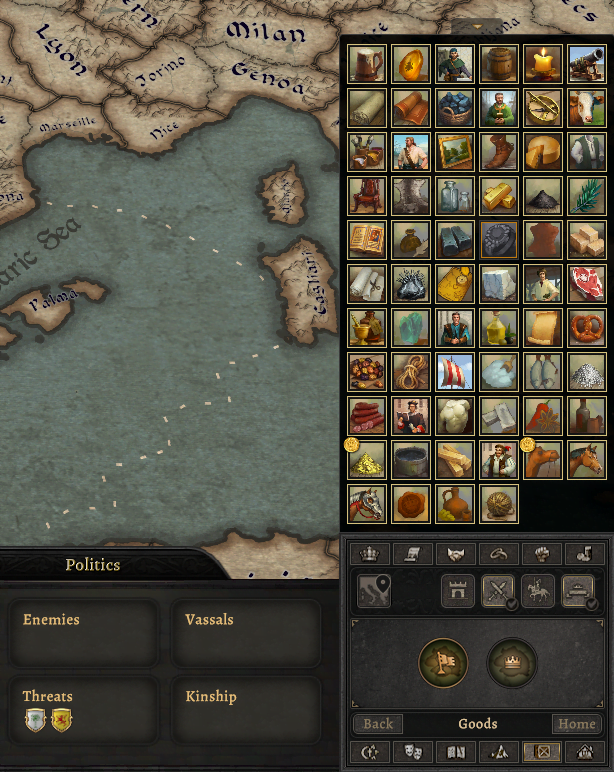
The Kingdom Adventages “Abundance”, “Masonry” and “Progress” are the easiest to get and most benefitial early on.
Chose the one, which is the easiest to achieve and your economy will benefit from it one way or the other. Look for Provinces, which provide the goods you need, before making invasion plans!
For example, you don’t need 5 provinces with Cattle Farms. If you are in war against a foe, sometimes it is not necessary to siege every single province of their kingdom. If the provinces doesn’t give you anything useful (be it goods or benefitial settlements), try to make the enemy kingdom a vassal or sign piece. This way you won’t have to deal with rebels or instability and could profit in more benefitial ways.
Lastly, later in the game, the building “Lord’s Castles” increases your max. Levies Capacity by 1000. A lot of Levies will be needed to recruit and maintain a strong, heavily armored army. Thus, secruring that you have at least 3000 Levies-Capacity will be very useful.
